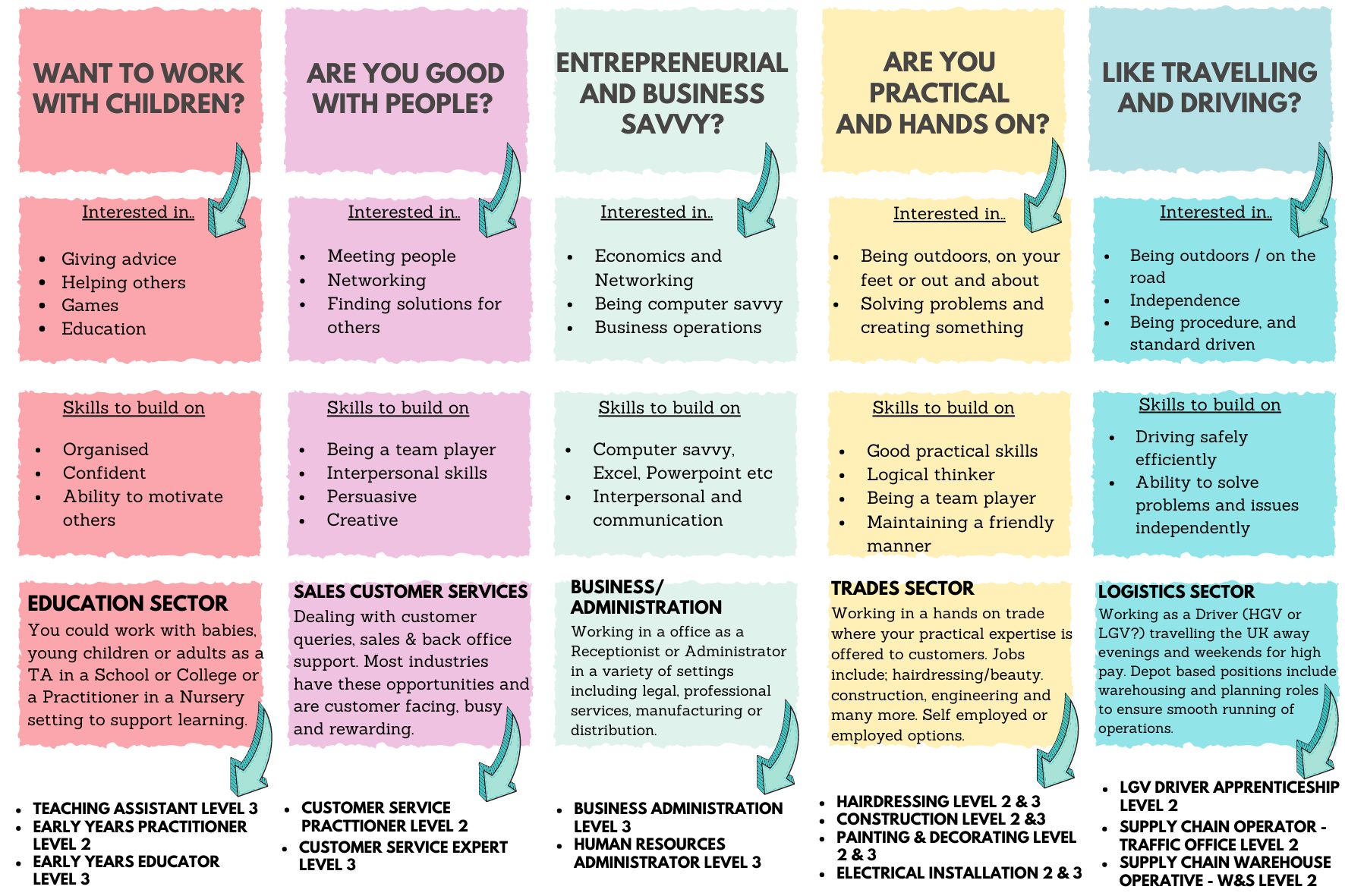There is a lot to consider when deciding which apprenticeship is the best choice for you, with the first thing being the company type and the industry in which it operates. These days, apprenticeships are available in every sector, meaning that the opportunities are vast!
Choosing an Industry
- Think about your own interests – what do you enjoy doing? Maybe it’s being around children, fixing things, or working on computers! You’re going to be doing it every day, so choose something you’re passionate about.
- What skills do you have – What could you really excel at? You might already have a transferable skill or talent, that is well suited to a specific industry/apprenticeship. Perhaps you’re business savvy, or have excellent interpersonal skills – so might be suited to Business Administration, or Customer Service.
- Do your research – Search and compare vacancies online and listen to previous apprentice testimonials. Remember, you can also contact the employer and university, college, or training provider to ask any questions you might have. Pay close attention to entry requirements at this stage.
- Consider regulations and workplace culture when deciding what works for you – For example the transport industry is notoriously fast paced, the education sector is governed by external organisations such as Ofsted and DFE. Some industries such as public sector and the NHS have set salary bandings for certain jobs whereas private sector salaries are usually negotiable.
Hopefully, the above points will help you narrow down your options, but we know how difficult it can be to make the right decision – so we’ve also created the below infographic to inform you of suitable options we can provide, based on your skills and interests. Or you could try an online career test to broaden your horizons, this is our favourite one!

Choosing an Apprenticeship Level
This is a much easier task, as it will probably be pre-determined by your current qualification level / grades. But if in doubt, seek advice on where is best to start your journey, and remember to take note of the assessment methods, to ensure you’re comfortable with these as can vary.
There are four types to choose from:
- Intermediate / Level 2 –This is the perfect beginner’s level of apprenticeship if you’re just starting out. Typically requires Grade D / above in Maths & English GCSE
- Advanced / Level 3 – For those with at least five GCSE’s, jumping straight to an advanced apprenticeship could be the best option. Typically requires Grade C / Above in Maths and English
- Higher / Level 4 – A higher apprenticeship can be the ideal starting block for someone with at least two A-levels.
- Degree / Level 5 – The highest level of apprenticeship. Completing a higher apprenticeship can lead to qualifications equivalent to an undergraduate or master’s degree.
Remember, you can progress up the Levels upon completion of a certain grade – and if you don’t hold a grade D / above in Maths and English, you can achieve the desired grades alongside your apprenticeship by studying for Functional Skills qualifications. System people can help you achieve the entry requirements with our Functional Skills Academy. Contact apprenticeships@system-people.co.uk for more information on this.
Choosing the Right Employer
You’ve picked the right industry and Level of Apprenticeship, all that is left is choosing your employer.
- Reputation – Whether it’s a big national company, or a small local business, do your research to ensure your potential employer has a good reputation. Check whether they have hired apprentices before, and how their experience was.
- Size – This is really important for two different reasons. Firstly, you might have a personal preference to work in a small company with fewer staff, or you might want to be in a bigger company. Large organisations often take on large numbers of apprentices as well as an in-house training academy. With smaller employers, you’re likely to be on your own and attending college for some of the week. If you want more info as to the pros and cons of working in a large or small company, check out our blog post which considers this in more detail.
- Environment – Often enhanced by the size and culture of the company – but If you want a more corporate feel to your apprenticeship with the opportunity for potentially many progression opportunities, perhaps in different locations, then larger company may be the way to go. Otherwise, if you think you would prefer a more intimate working environment where you know all employees well and with potential to stay local once completion, then look to smaller company apprenticeships.
We also caught up with Alexander Hicks, Business Administration and Customer Service Tutor who shares his advice when choosing the right apprenticeship:
“Be strategic. Find out where the growth sectors are in your area. Which ones are the fastest growing for jobs? You could look at this another way, i.e. revenue growth, the lists won’t be the same. Courses like Business Administration Level 3 and Customer Service Level 2 are great if you don’t know exactly what sector you want to specialise in yet, because you acquire transferable skills that can be utilised for opportunities in some of the following UK sectors where there is job growth and vacancies: E-commerce/Online Shoppin, Health Care Services, Medical Care Service, Social Care Services, Digital content, social media and digital marketing, Customer Services, Education, Logistics”


